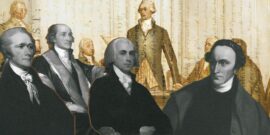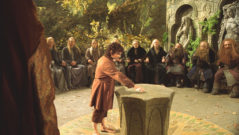The revised and expanded edition of J. R. R. Tolkien’s Letters reveals greater insight about his relationship to publishers, his family, and his faith.
Henry T. Edmondson III
As moderate parties struggle to form coalitions, extremists on both right and left are able to exert more influence.
It is possible to find contemporary relevance in The Federalist without losing sight of its historical context and significance.
Those troubled by the present state of American politics might take some comfort in seeing how Publius addressed the challenges of his own age.
Hundreds of judicial positions sit vacant while a rudderless government dithers about what to do.
Public education has become a cultural battleground, and children are the collateral damage.
Two recent books show Flannery O'Connor as a college student, and as a budding writer yearning for grace.
J.R.R. Tolkien understood, as many social activists do not, that mercy and forgiveness are essential for human life.
It's the end of the world as we know it. And I feel fine.
Aquinas identified thoughtlessness as the failure to take the care, time, and interest necessary for responsible speech. It may be the vice of our time.
Tolkien saw the destructive potential of all forms of government. He endorsed none of them through his stories.
Saruman's dangerous tongue offers to rescue men from ruin: "Indeed I alone can aid you now."
Pink Floyd's diagnosis of our present state is remarkable, and when that acumen is expressed through their art, it is arresting.
The idea that education should be an engine of social change has been a hallmark of progressivism for years, so we can’t say we weren’t warned.
Peeples helps us to see that Poe’s imagination was stoked by his external surroundings as well as by his interior life.
Must we now embrace unreformed education as an article of faith? Some may prefer to practice their liturgy elsewhere.
Rolling Stone magazine called “Imagine” John Lennon’s musical gift to the world. If so, be sure to keep the receipt.
We could be on the cusp of seeing just how fragile and illogical the higher-ed business model is.
For shallow souls who never experience the virtue that grows out of inner turbulence, Dylan’s confession may be inscrutable.
The Capital is both a lampoon of the EU's bureaucratic pathologies and a backhanded slap at a primary cause of its friction: national attachments.
Hope is not so much about what will be; rather it is anchored in the ideals of the present and even the past.
O'Connor's correspondence is a goldmine of piercing insight and startling reflections on everything from literature to philosophy to raising peacocks.
Henry T. Edmondson III, is Carl Vinson Professor of Political Science and Public Administration at Georgia College. He writes in several areas, including Politics and Literature, Educational Philosophy, European Politics, and American Political Thought. His most recent book is The Course of Human Events: American Government for the 21st Century (Kendall Hunt Publishing, August 2020).




















